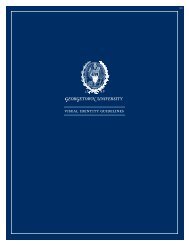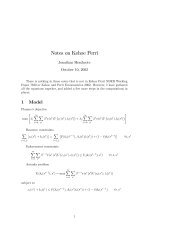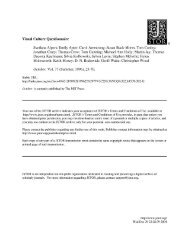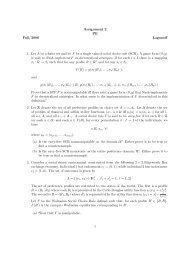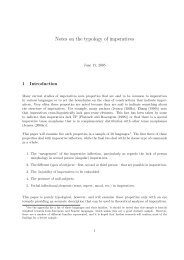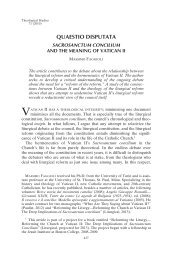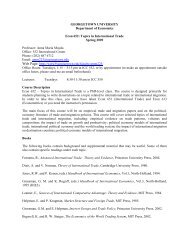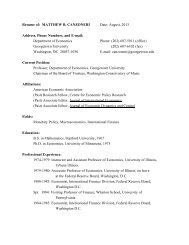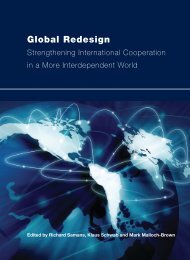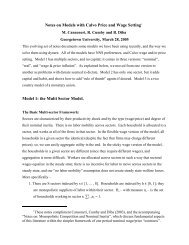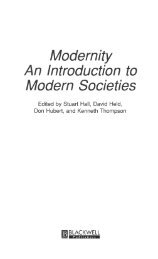Islam and the West: Annual Report on the State of Dialogue
Islam and the West: Annual Report on the State of Dialogue
Islam and the West: Annual Report on the State of Dialogue
You also want an ePaper? Increase the reach of your titles
YUMPU automatically turns print PDFs into web optimized ePapers that Google loves.
<str<strong>on</strong>g>Islam</str<strong>on</strong>g> <str<strong>on</strong>g>and</str<strong>on</strong>g> <str<strong>on</strong>g>the</str<strong>on</strong>g> <str<strong>on</strong>g>West</str<strong>on</strong>g>: <str<strong>on</strong>g>Annual</str<strong>on</strong>g> <str<strong>on</strong>g>Report</str<strong>on</strong>g> <strong>on</strong> <str<strong>on</strong>g>the</str<strong>on</strong>g> <strong>State</strong> <strong>of</strong> <strong>Dialogue</strong><br />
18<br />
Introducti<strong>on</strong><br />
Box 1.4<br />
A<strong>Dialogue</strong>forResults<br />
John L. Esposito<br />
John L. Esposito is University Pr<strong>of</strong>essor <str<strong>on</strong>g>and</str<strong>on</strong>g> Founding Director <strong>of</strong> <str<strong>on</strong>g>the</str<strong>on</strong>g> Prince Alwaleed Bin Talal Center for<br />
Muslim-Christian Underst<str<strong>on</strong>g>and</str<strong>on</strong>g>ing at Georgetown University. He is <str<strong>on</strong>g>the</str<strong>on</strong>g> author <strong>of</strong> many books <strong>on</strong> <str<strong>on</strong>g>Islam</str<strong>on</strong>g> including,<br />
most recently, Who Speaks for <str<strong>on</strong>g>Islam</str<strong>on</strong>g>? What a Billi<strong>on</strong> Muslims Really Think.<br />
Muslims <str<strong>on</strong>g>and</str<strong>on</strong>g> Christians have engaged in dialogues for several decades. Post-9/11 <str<strong>on</strong>g>the</str<strong>on</strong>g> UN, World Ec<strong>on</strong>omic Forum,<br />
OIC (Organizati<strong>on</strong> <strong>of</strong> <str<strong>on</strong>g>the</str<strong>on</strong>g> <str<strong>on</strong>g>Islam</str<strong>on</strong>g>ic C<strong>on</strong>ference) <str<strong>on</strong>g>and</str<strong>on</strong>g> many governments have been c<strong>on</strong>ducting interreligious <str<strong>on</strong>g>and</str<strong>on</strong>g> intercivilizati<strong>on</strong>al<br />
dialogues globally. Such attenti<strong>on</strong> signals a new, more comprehensive role for religi<strong>on</strong> in internati<strong>on</strong>al<br />
affairs: in war <str<strong>on</strong>g>and</str<strong>on</strong>g> peace, democratizati<strong>on</strong>, civil society, educati<strong>on</strong>al <str<strong>on</strong>g>and</str<strong>on</strong>g> ec<strong>on</strong>omic development.<br />
As <str<strong>on</strong>g>the</str<strong>on</strong>g> stakes for interreligious underst<str<strong>on</strong>g>and</str<strong>on</strong>g>ing rise, it’s crucially important to focus our dialogues by asking: How can<br />
we better target <str<strong>on</strong>g>the</str<strong>on</strong>g> problems? What resources do we need to address <str<strong>on</strong>g>the</str<strong>on</strong>g>m? What strategies can get results?<br />
Peter Berger, <strong>on</strong>e <strong>of</strong> <str<strong>on</strong>g>the</str<strong>on</strong>g> “fa<str<strong>on</strong>g>the</str<strong>on</strong>g>rs” <strong>of</strong> secularizati<strong>on</strong> <str<strong>on</strong>g>the</str<strong>on</strong>g>ory, has observed: “We made a category mistake. We thought<br />
that <str<strong>on</strong>g>the</str<strong>on</strong>g> relati<strong>on</strong>ship was between modernizati<strong>on</strong> <str<strong>on</strong>g>and</str<strong>on</strong>g> secularizati<strong>on</strong>. In fact it was between modernizati<strong>on</strong> <str<strong>on</strong>g>and</str<strong>on</strong>g> pluralism.”<br />
Ir<strong>on</strong>ically, in a world <strong>of</strong> globalizati<strong>on</strong> when pluralism <str<strong>on</strong>g>and</str<strong>on</strong>g> tolerance have never been more important, hegem<strong>on</strong>ic <str<strong>on</strong>g>and</str<strong>on</strong>g><br />
exclusivist ideologies <str<strong>on</strong>g>and</str<strong>on</strong>g> <str<strong>on</strong>g>the</str<strong>on</strong>g>ologies are ascendant.<br />
Appealing to religi<strong>on</strong> (al-Qaeda) or denigrating it (<str<strong>on</strong>g>the</str<strong>on</strong>g> Danish carto<strong>on</strong>s) has become a way to express or legitimate<br />
grievances. However, “preachers <strong>of</strong> hate” – Muslim <str<strong>on</strong>g>and</str<strong>on</strong>g> n<strong>on</strong>-Muslim, from <str<strong>on</strong>g>the</str<strong>on</strong>g> political <str<strong>on</strong>g>and</str<strong>on</strong>g> religious far right – are as<br />
motivated by identity politics, anti-immigrant policies <str<strong>on</strong>g>and</str<strong>on</strong>g> socioec<strong>on</strong>omic c<strong>on</strong>diti<strong>on</strong>s as by <str<strong>on</strong>g>the</str<strong>on</strong>g>ology. Threats to nati<strong>on</strong>al<br />
identity <str<strong>on</strong>g>and</str<strong>on</strong>g> security in <str<strong>on</strong>g>the</str<strong>on</strong>g> <str<strong>on</strong>g>West</str<strong>on</strong>g> <str<strong>on</strong>g>and</str<strong>on</strong>g> political grievances in <str<strong>on</strong>g>the</str<strong>on</strong>g> Muslim world are primary catalysts.<br />
To resp<strong>on</strong>d to <str<strong>on</strong>g>the</str<strong>on</strong>g>ir charges <str<strong>on</strong>g>and</str<strong>on</strong>g> build bridges <strong>of</strong> underst<str<strong>on</strong>g>and</str<strong>on</strong>g>ing <str<strong>on</strong>g>and</str<strong>on</strong>g> respect, we need more effective terminology <str<strong>on</strong>g>and</str<strong>on</strong>g><br />
more powerful counter narratives. Phrases such as “Muslim world <str<strong>on</strong>g>and</str<strong>on</strong>g> <str<strong>on</strong>g>the</str<strong>on</strong>g> <str<strong>on</strong>g>West</str<strong>on</strong>g>”, “<str<strong>on</strong>g>West</str<strong>on</strong>g>-<str<strong>on</strong>g>Islam</str<strong>on</strong>g>ic”, like <str<strong>on</strong>g>the</str<strong>on</strong>g>ir counterpart –<br />
“clash <strong>of</strong> civilizati<strong>on</strong>s” – fail to adequately reflect a complex, multifaceted reality that is political <str<strong>on</strong>g>and</str<strong>on</strong>g> ec<strong>on</strong>omic as much<br />
as it is religious or cultural.<br />
They fail to counter <str<strong>on</strong>g>the</str<strong>on</strong>g> growth <strong>of</strong> <str<strong>on</strong>g>Islam</str<strong>on</strong>g>ophobia <str<strong>on</strong>g>and</str<strong>on</strong>g> c<strong>on</strong>cepts such as <str<strong>on</strong>g>Islam</str<strong>on</strong>g><strong>of</strong>ascism that say so much <str<strong>on</strong>g>and</str<strong>on</strong>g> do so much<br />
harm. Once respectable terms such as “tolerance” need to be replaced or transformed from <str<strong>on</strong>g>the</str<strong>on</strong>g> noti<strong>on</strong> <strong>of</strong> “sufferance”<br />
or “endurance” <strong>of</strong> “<str<strong>on</strong>g>the</str<strong>on</strong>g> o<str<strong>on</strong>g>the</str<strong>on</strong>g>r” <str<strong>on</strong>g>and</str<strong>on</strong>g> reinforced by terms that promote mutual underst<str<strong>on</strong>g>and</str<strong>on</strong>g>ing <str<strong>on</strong>g>and</str<strong>on</strong>g> equal respect.<br />
There is a culture war out <str<strong>on</strong>g>the</str<strong>on</strong>g>re. The forces <strong>of</strong> bigotry <str<strong>on</strong>g>and</str<strong>on</strong>g> c<strong>on</strong>fr<strong>on</strong>tati<strong>on</strong> have powerful resources <str<strong>on</strong>g>and</str<strong>on</strong>g> access. The driving<br />
force behind all initiatives has to be <str<strong>on</strong>g>the</str<strong>on</strong>g> belief that acti<strong>on</strong>s really do speak louder than words. Therefore, <str<strong>on</strong>g>the</str<strong>on</strong>g> challenge<br />
to all joint statements issued by religious or political leaders will be <str<strong>on</strong>g>the</str<strong>on</strong>g> questi<strong>on</strong>: So what? How are statements linked<br />
to acti<strong>on</strong> plans that penetrate <str<strong>on</strong>g>the</str<strong>on</strong>g> fabric <strong>of</strong> our societies?<br />
C<strong>on</strong>ferences <str<strong>on</strong>g>and</str<strong>on</strong>g> interreligious <str<strong>on</strong>g>and</str<strong>on</strong>g> inter-civilizati<strong>on</strong>al dialogues remain important, but so too are programmes training<br />
foreign service <strong>of</strong>ficers, teachers <str<strong>on</strong>g>and</str<strong>on</strong>g> clergy, as well as <str<strong>on</strong>g>the</str<strong>on</strong>g> next generati<strong>on</strong>. Popular culture initiatives: movies, TV<br />
programmes <str<strong>on</strong>g>and</str<strong>on</strong>g> music promoting <str<strong>on</strong>g>and</str<strong>on</strong>g> reinforcing religious <str<strong>on</strong>g>and</str<strong>on</strong>g> cultural pluralism also remain critical. The power <strong>of</strong><br />
media which tends to feature bad news (c<strong>on</strong>flict <str<strong>on</strong>g>and</str<strong>on</strong>g> c<strong>on</strong>troversy) can also be used to dem<strong>on</strong>strate <str<strong>on</strong>g>the</str<strong>on</strong>g> positive realities<br />
<strong>of</strong> <str<strong>on</strong>g>the</str<strong>on</strong>g> mainstream. Workshops should be <strong>of</strong>fered for local newspaper reporters who influence <str<strong>on</strong>g>the</str<strong>on</strong>g> general public.<br />
Prominent media moguls need to be reached by equally prominent leaders who challenge <str<strong>on</strong>g>the</str<strong>on</strong>g>ir c<strong>on</strong>tent <str<strong>on</strong>g>and</str<strong>on</strong>g> promote<br />
more balanced coverage.<br />
The Internet has become a major tool for informati<strong>on</strong> or misinformati<strong>on</strong> as well as diatribe by militant anti-Muslim <str<strong>on</strong>g>and</str<strong>on</strong>g><br />
anti-<str<strong>on</strong>g>West</str<strong>on</strong>g>ern websites <str<strong>on</strong>g>and</str<strong>on</strong>g> blogs. A <str<strong>on</strong>g>West</str<strong>on</strong>g>-<str<strong>on</strong>g>Islam</str<strong>on</strong>g>ic blog is needed that tracks, reports <strong>on</strong> <str<strong>on</strong>g>and</str<strong>on</strong>g> resp<strong>on</strong>ds to <str<strong>on</strong>g>the</str<strong>on</strong>g> anti-religious,<br />
racist <str<strong>on</strong>g>and</str<strong>on</strong>g> anti-immigrant hate speech <strong>on</strong> both sides.<br />
For those who think this is just a wish list or an insurmountable challenge, <str<strong>on</strong>g>the</str<strong>on</strong>g> sobering reality is that preachers <strong>of</strong> hate<br />
already have <str<strong>on</strong>g>the</str<strong>on</strong>g> financial <str<strong>on</strong>g>and</str<strong>on</strong>g> human resources – <str<strong>on</strong>g>the</str<strong>on</strong>g> websites, media access <str<strong>on</strong>g>and</str<strong>on</strong>g> political commentators. So what’s<br />
our choice?



